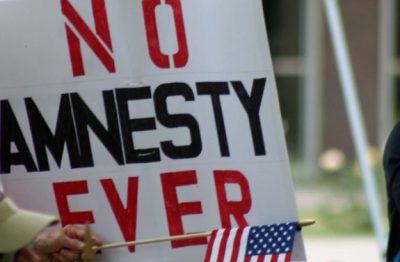Immigration Reform
The last time Congress updated our legal immigration system was November 1990, one month before the World Wide Web went online. We are long overdue for comprehensive immigration reform.
Through immigration reform, we can provide noncitizens with a system of justice that provides due process of law and a meaningful opportunity to be heard. Because it can be a contentious and wide-ranging issue, we aim to provide advocates with facts and work to move bipartisan solutions forward. Read more about topics like legalization for undocumented immigrants and border security below.
How Congress Can Better Protect Immigrant Victims of Crime
BY ANDREA RAMOS, SOUTHWESTERN LAW SCHOOL This week the Washington Post reported on two laws that protect victims of domestic abuse who are also immigrants. The story profiles women who were literally saved from abusive relationships by law enforcement who then guided them to programs that offer a special form of immigration relief for victims. Read More

New Report Examines Dire Consequences of “Attrition through Enforcement” Immigration Strategy
Federal immigration enforcement resources have increased significantly in recent years, as have the number of deportations. Meanwhile, states have passed harsh immigration laws intended to crack down on unauthorized immigrants. Presidential candidate Mitt Romney has announced that he supports a policy of “self-deportation.” What do these things have in common? The belief that making daily life miserable for undocumented immigrants will result in “self-deportation”—or “attrition through enforcement.” A new paper today out of the Immigration Policy Center connects the dots between the strategy of “attrition through deportation” and federal and state anti-immigrant proposals and explains how attrition through enforcement has gone from being a catchy phrase coined by immigration restrictionists to a frightening reality in many parts of the U.S. Read More

More States Introduce Costly Immigration Enforcement Bills in 2012
Despite the devastating consequences of state immigration laws in Alabama and Arizona, legislators in other states have introduced similar enforcement bills this year. Legislators in Mississippi, Missouri, Tennessee and Virginia introduced an array of costly immigration enforcement bills in their 2012 legislative sessions—some which are modeled on Arizona’s SB 1070. While study after study continues to document how these extreme state laws are costing state economies, disrupting entire industries and driving communities further underground, state legislators clearly aren’t getting the message. Read More

Alabama’s Extreme Immigration Law Could Cost State Billions, Report Finds
Implementing Alabama’s extreme immigration law (HB 56) would be incredibly expensive. That is the bottom line of a new report by University of Alabama economist Samuel Addy entitled A Cost-Benefit Analysis of the New Alabama Immigration Law. According to the report, the law could cost Alabama up to $11 billion in GDP and nearly $265 million in state income and sales tax. The loss includes 1) implementation, enforcement, and litigation expenditures; 2) increased costs and inconveniences for citizens and legal residents and businesses; 3) reduced economic development opportunities because it creates a poor business climate; and 4) the economic impact of reduced aggregate demand due to some unauthorized immigrants leaving and therefore not earning and spending income in the state. Read More

Missouri State Legislature Pursing Budget Busting Solutions to Immigration
Washington D.C. – As Missouri faces a $704 million shortfall in fiscal year 2012, state legislators are currently pursuing a costly and short-sighted anti-immigrant law. Senate Bill 590 is similar to the immigration law passed in Alabama and is currently working its way through the state legislature. The… Read More

Following State of the Union, President Obama Needs to Follow Through on Immigration Reforms
The President’s State of the Union address this week re-iterated some of his key themes on immigration—support for comprehensive reform, dismay that DREAM Act students and foreign students educated in this country have no way to legalize their status, and a belief that he’s done enough to the secure the border. More importantly, he framed these themes in context to America’s economic recovery, innovation and growth. However, while any mention of immigration in the State of the Union is welcome, it’s what the President didn’t say that may have more of an impact on how his administration is remembered this year on immigration—and how his vision is measured by voters in the coming election. Read More

New Report Highlights Contributions of Immigrant Entrepreneurs to U.S. Economy
BY MARCIA HOHN, IMMIGRANT LEARNING CENTER At last night’s State of the Union Address, two immigrant entrepreneurs were among the President's guests—Japan-born Dr. Hiroyuki Fujita, founder, president and chief executive officer of Quality Electrodynamics (QED) in Cleveland, Ohio and Brazil-born Mike Krieger, co-founder of Instagram, a fast growing social mobile startup. Dr. Fijuita and Mike Krieger were rightfully recognized for their entrepreneurial drive and hard-earned success (both businesses are now worth millions of dollars), but they are just two examples of immigrants who came to this country and started businesses. There are many more unsung immigrant entrepreneurs whose U.S. businesses continue to create jobs for Americans and strengthen the U.S. economy. Read More

Advocates Call Romney’s Relationship with Anti-Immigrant Hawk “Political Suicide”
As if Mitt Romney’s repeated promise to veto the DREAM Act wasn’t alienating enough, advocates warn that Romney’s continued relationship with famed anti-immigrant hawk Kris Kobach is killing future support from Latino voters, especially in key states like New Mexico, Nevada, Colorado and Florida. Kobach, co-author of Arizona and Alabama’s extreme immigration enforcement laws, appeared in South Carolina Monday night to spin for the Romney campaign following the GOP debate. Read More

Anti-Immigrant Crowd Cries Wolf in Response to Administration’s Family Unity Policy
The Obama administration’s recent announcement that it intends to change regulations allowing the children and spouses of American citizens to stay together while processing applications for legal permanent resident status has the immigration restrictionists crying wolf—or more accurately “amnesty”—once again. They are characterizing the administration’s rule change, as they do any and all actions that are not enforcement related, as a “backdoor amnesty.” Some are also characterizing the change as a strategy to bypass Congress. Read More

New Report Finds that Immigration Creates U.S. Jobs
Immigration creates jobs for native-born Americans. That is the fundamental finding of a new study from the American Enterprise Institute and the Partnership For A New American Economy, entitled Immigration and American Jobs. The study—authored by Madeline Zavodny, a professor of economics at Agnes Scott College—reinforces the findings of numerous other studies which have demonstrated that there is no correlation between immigration and unemployment. Specifically, Zavodny analyzes Census data with the aim of answering one pivotal question: “In states with more immigrants, are US natives more or less likely to have a job?” Zavodny focuses on two groups in particular: immigrants with advanced degrees, and immigrants of any skill level who are in the country on temporary visas. Read More
Make a contribution
Make a direct impact on the lives of immigrants.
